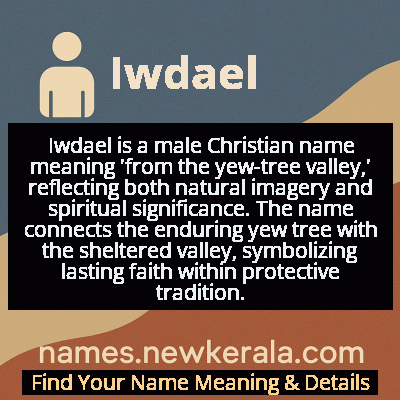Iwdael Name Meaning & Details
Origin, Popularity, Numerology Analysis & Name Meaning of Iwdael
Discover the origin, meaning, and cultural significance of the name IWDAEL. Delve into its historical roots and explore the lasting impact it has had on communities and traditions.
Name
Iwdael
Gender
Male
Origin
Christian
Lucky Number
9
Meaning of the Name - Iwdael
Iwdael is a male Christian name meaning 'from the yew-tree valley,' reflecting both natural imagery and spiritual significance. The name connects the enduring yew tree with the sheltered valley, symbolizing lasting faith within protective tradition.
Iwdael - Complete Numerology Analysis
Your Numerology Number
Based on Pythagorean Numerology System
Ruling Planet
Mars
Positive Nature
Generous, passionate, energetic, and humanitarian.
Negative Traits
Impulsive, impatient, moody, and can be overly emotional.
Lucky Colours
Red, maroon, scarlet.
Lucky Days
Tuesday.
Lucky Stones
Red coral, garnet.
Harmony Numbers
1, 2, 3, 6.
Best Suited Professions
Military, sports, philanthropy, leadership roles.
What People Like About You
Courage, energy, leadership, generosity.
Famous People Named Iwdael
Iwdael of Cornwall
Christian missionary
Established early monastic communities in southwestern Britain
Iwdael ap Cynfarch
Welsh chieftain
Maintained Christian traditions during Saxon expansion in 7th century Wales
Saint Iwdael
Monk and scholar
Preserved Christian manuscripts and established influential scriptorium
Iwdael Morgan
Theologian
Wrote important commentaries on Celtic Christian practices
Name Variations & International Equivalents
Click on blue names to explore their detailed meanings. Gray names with will be available soon.
Cultural & Historical Significance
Extended Personality Analysis
Men named Iwdael typically exhibit a combination of steadfastness and spiritual depth that reflects their name's meaning. They tend to be deeply rooted individuals who value tradition and continuity, much like the ancient yew trees referenced in their name. This often manifests as loyalty to family, community, and faith traditions, with a strong sense of responsibility toward preserving what they consider valuable. Their 'valley' association suggests a personality that creates spaces of safety and growth for others - they are often natural counselors, teachers, or spiritual guides who help people navigate life's challenges. At the same time, Iwdaels possess the resilience of the yew, able to withstand difficulties and adapt while maintaining their core identity. They may appear reserved to strangers but reveal rich inner lives and profound insights to those who earn their trust. This combination of depth and durability makes them particularly effective in roles requiring long-term commitment and wisdom, whether in religious vocations, education, or community leadership. Their strength lies not in flashy achievements but in consistent, meaningful contributions that endure over time.
Modern Usage & Popularity
In contemporary naming practices, Iwdael remains quite rare but has experienced a modest resurgence as part of the broader Celtic revival movement and interest in historically significant names. It's primarily chosen by parents seeking names with deep spiritual meaning and cultural heritage, particularly those with Welsh, Cornish, or Breton ancestry. The name appeals to families valuing uniqueness without complete obscurity, as it sounds familiar enough to be accessible while being distinctive. Modern usage often occurs in religious contexts, especially within Celtic Christian communities that emphasize the distinctive traditions of early British Christianity. While not appearing in mainstream popularity charts, the name maintains a steady presence in specific cultural and religious circles. Its usage reflects a desire to connect children with both Christian faith and Celtic identity, offering a name that embodies endurance, spiritual depth, and cultural continuity in an increasingly homogenized world.
Symbolic & Spiritual Meanings
Symbolically, Iwdael represents the intersection of natural endurance and spiritual sanctuary. The yew tree component carries meanings of longevity, regeneration, and the connection between life and death - in Christian symbolism, this translates to eternal life, resurrection, and the enduring nature of faith. Yews were sacred in pre-Christian traditions and later became associated with churchyards, making them powerful symbols of continuity between different spiritual worldviews. The valley element symbolizes protection, fertility, and the soul's inner journey - a place where spiritual seeds can grow sheltered from harsh external conditions. Together, these symbols create a rich metaphorical landscape: the enduring faith represented by the yew finds its nurturing environment in the protective valley of community and contemplation. In Christian interpretation, this can be seen as representing both the individual's enduring faith and the church as a nurturing community. The name thus embodies the idea of spiritual strength growing within protective tradition, offering a powerful symbolic identity for those who bear it.

